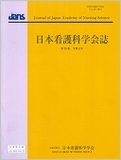Japanese
English
- 販売していません
- Abstract 文献概要
- 参考文献 Reference
要旨
目的:高齢レシピエントの自己管理行動の現状と自己管理行動に影響する要因を明らかにすることである.
方法:「日本肝移植研究会」に登録された移植実施施設67か所のうち,18施設の移植コーディネーターや医師に研究協力を依頼した.協力が得られた7施設で外来受診時の65歳以上の生体肝移植レシピエントに無記名自記式質問紙を配布し,回収された167人分を分析した.
結果:91.6%のレシピエントが免疫抑制剤を内服していたが,49.7%は副作用の理解が不十分であった.女性レシピエントは「移植後の期間」が経過すると日々の観察に関する自己管理行動を疎かにしていた.また,フレイルの女性は「健康増進実行度」が低かった.
結論:高齢レシピエントは免疫抑制剤の副作用自体の理解は不十分であったが,自己管理行動はできていた.女性レシピエントでは「移植後の期間」が「日々の観察実行度」,フレイルが「健康増進実行度」に影響していた.
Objective: This study aims to examine the current state of self-management behavior in elderly living donor-liver transplant recipients (LRs) and determine the factors correlated with such behavior.
Methods: We requested the transplant coordinators and doctors from 18 of the 67 transplant hospitals identified by Japanese Liver Transplantation Society for the enrollment of LRs. A total of 167 Japanese LRs aged ≥65 years were enrolled, who answered anonymous self-administered questionnaires at seven hospitals.
Results: We found that 91.6% LRs were administered with immunosuppressant medication, although 49.7% could not adequately comprehend the corresponding side effects. Female LRs gradually ignored the daily-life observation of self-management behavior following transplantation. Furthermore, females who experienced frailty exhibited lower “health-promotion scores.”
Conclusions: Although LRs could not adequately comprehend the side effects of their medications, overall, they performed self-management behavior. In female LRs, the factor that correlated with “daily-observation scores” was “the periods following transplantation” and the factor that correlated with “health-promotion scores” was frailty.
Copyright © 2019, Japan Academy of Nursing Science. All rights reserved.


